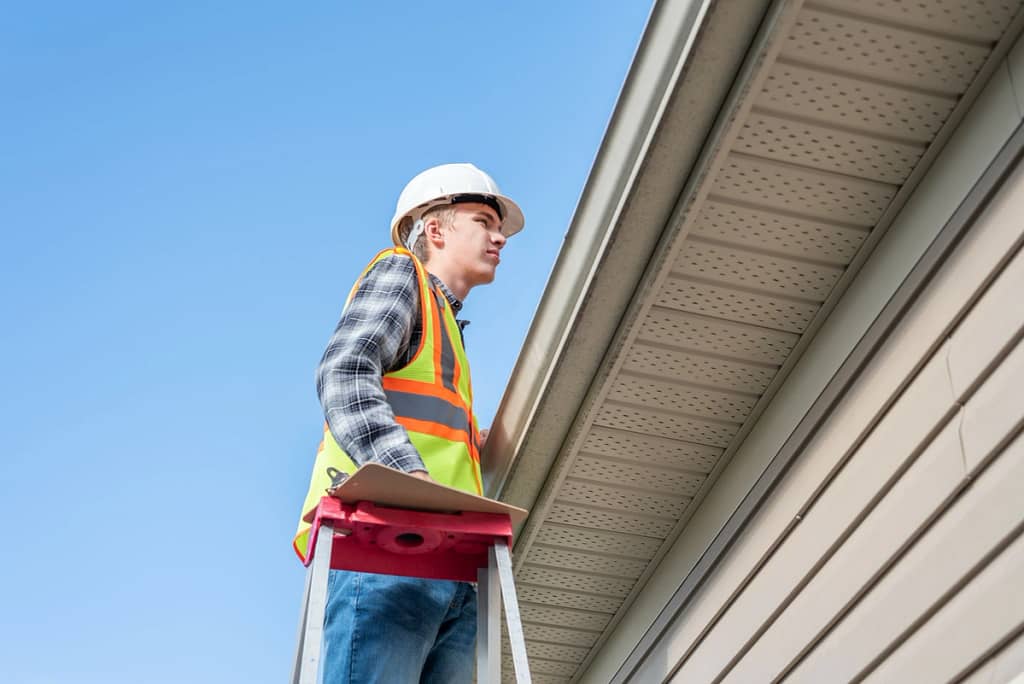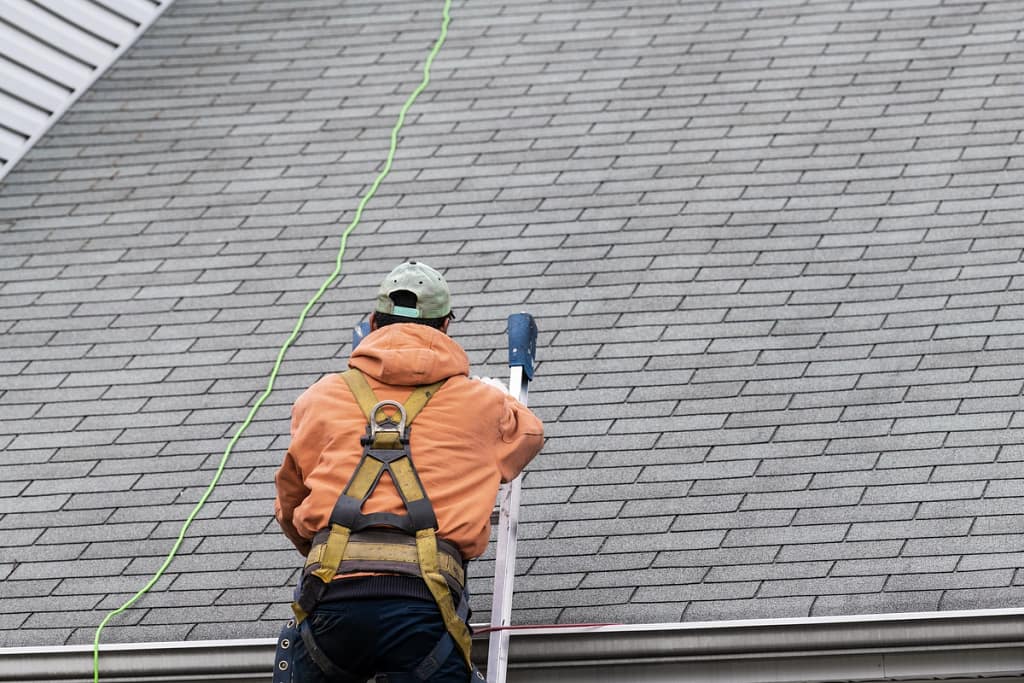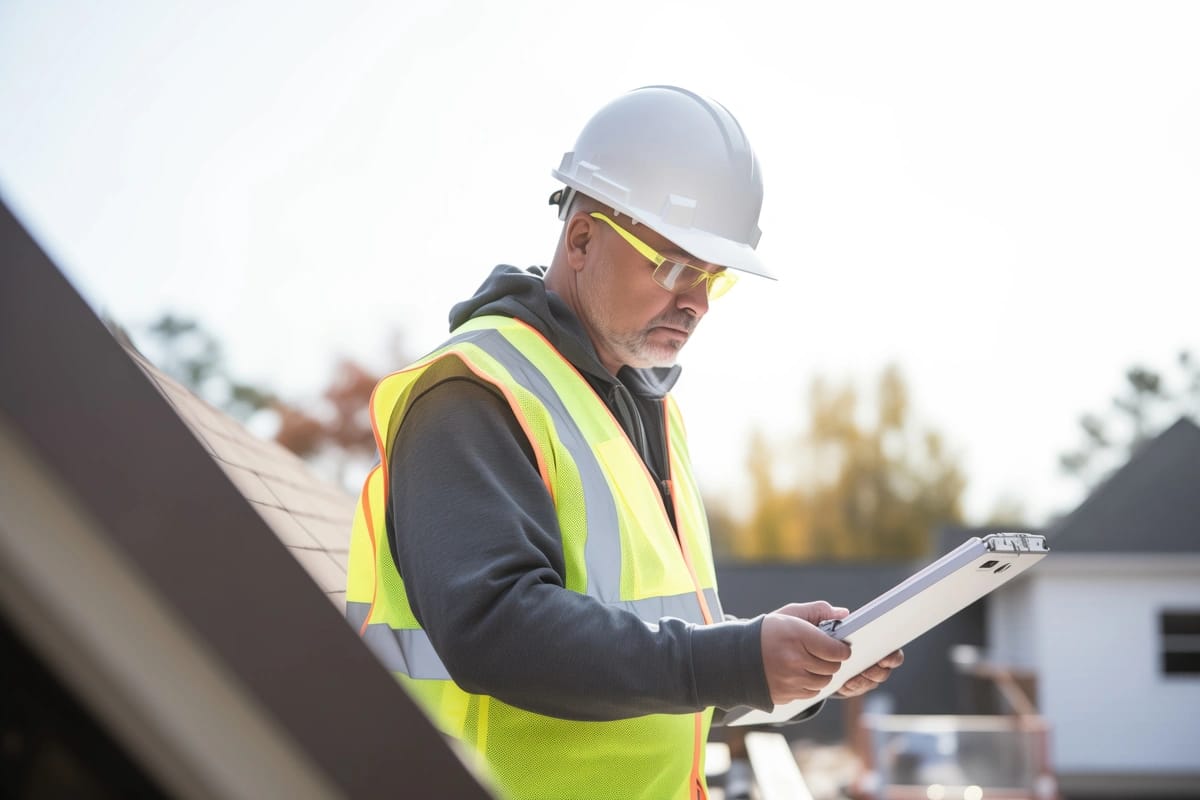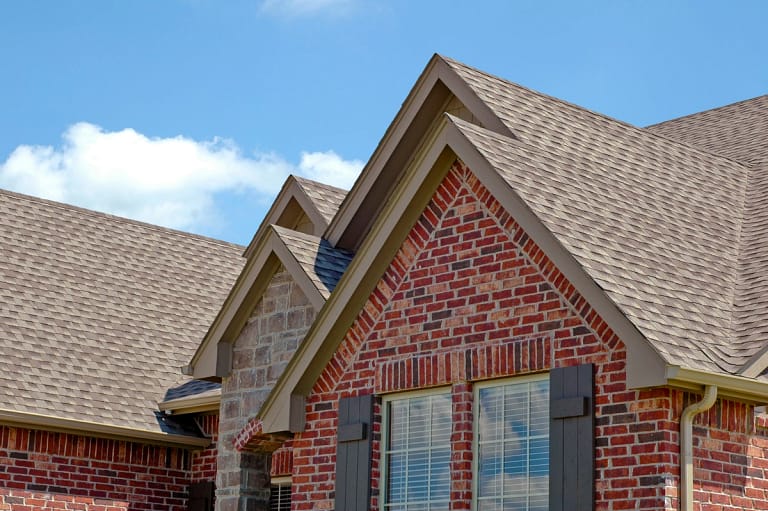Your home’s roof is one of its most critical components, protecting you and your belongings from the elements year-round. However, even the most durable roofs can sustain damage over time due to various factors like:
- Weather conditions ⛈️
- Age 👴🏼
- Wear and tear 🏚️
When it comes to ensuring your home is adequately protected, a roof inspection for insurance purposes is indispensable. In this comprehensive guide, we’ll explore the importance of roof inspections, signs that indicate you need one, what to expect during an inspection, associated costs, and what homeowner’s insurance typically covers.
Signs That You Need a Roof Inspection

People have roof inspections for a wide variety of reasons. Here are some signs that your roof needs an inspection!
- Age of the Roof: If your roof is over 20 years old, it’s advisable to have it inspected regularly, as older roofs are more prone to damage and deterioration.
- Missing or Damaged Shingles: Missing, cracked, or curling shingles are signs of potential roof damage and should prompt an inspection.
- Leaks or Water Stains: Water stains on your ceiling or walls, as well as signs of water leakage in your attic, indicate possible roof issues that need immediate attention.
- Sagging or Uneven Areas: A sagging or uneven roofline could signify structural damage or compromised support beams, necessitating a professional inspection.
- Granule Loss: Accumulation of granules in gutters or downspouts is a red flag indicating deteriorating shingles and potential roof damage.
Why You Need a Roof Inspection for Your Insurance Claim
When filing an insurance claim for storm damage for your roof, a roof inspection is almost always necessary. Here’s why:
- Prevents Further Damage: Timely roof inspections can identify and address minor issues before they escalate into major problems, ultimately saving you money on costly repairs.
- Validates Insurance Coverage: Many homeowner’s insurance policies require regular roof inspections to maintain coverage eligibility. Failing to adhere to these requirements could result in claim denials or reduced payouts.
- Facilitates Claims Process: In the event of roof damage from covered perils like storms or falling debris, a recent inspection report serves as crucial documentation to support your insurance claim, expediting the claims process.
5 Things Your Inspector Will Look For
Want to know what your roof inspection will consist of? Here’s what your inspector is keeping an eye out for:
1) Roofing Material Condition
The inspector will assess the condition of your roof’s shingles or other roofing materials, looking for signs of damage, deterioration, or wear.
2) Flashing Integrity
Flashing around vents, chimneys, skylights, and other roof penetrations will be inspected for proper installation and integrity to prevent water intrusion.
3) Gutters and Drainage
Proper gutter function and adequate drainage away from the house are essential for preventing water damage to the roof and home’s foundation.
4) Structural Integrity
The inspector will evaluate the roof’s structural components, including trusses, rafters, and sheathing, for signs of damage or deterioration that could compromise its stability.
5) Ventilation
Adequate attic ventilation is crucial for regulating temperature and moisture levels, preventing moisture buildup that can lead to mold growth and structural damage.
How Much a Roof Inspection Costs
The cost of a roof inspection can vary depending on several factors, including the size and complexity of your roof, your location, and the inspector’s expertise. On average, you can expect to pay between $150 to $500 for a professional roof inspection. However, some roofing companies may offer free or discounted inspections as part of their services, especially if you’re considering roof repairs or replacement with them.
Roof Damage That Homeowner’s Insurance Will and Won’t Cover
Unfortunately, not all roof damage is covered by your insurance policy. Here is some insight into what is and is not covered by your insurance company.
✅ Covered Perils
- Storm Damage: Damage caused by severe weather events such as windstorms, hailstorms, hurricanes, or tornadoes is typically covered by homeowner’s insurance policies.
- Fire Damage: Homeowner’s insurance typically covers roof damage resulting from fires, including damage caused by wildfires or lightning strikes.
- Falling Objects: Damage caused by falling objects such as tree limbs, branches, or debris from neighboring properties is usually covered by homeowner’s insurance.
- Vandalism or Theft: Roof damage resulting from vandalism or theft attempts is generally covered under most homeowner’s insurance policies.
❌ Exclusions:
- Wear and Tear: Normal wear and tear, aging, and gradual deterioration of the roof are typically excluded from coverage under homeowner’s insurance policies.
- Neglect or Lack of Maintenance: Damage resulting from neglect, lack of maintenance, or failure to address known issues through timely repairs is not covered by homeowner’s insurance.
- Flood Damage: Damage caused by floods, including water entering the home from overflowing rivers, lakes, or storm surges, is not covered under standard homeowner’s insurance policies and requires separate flood insurance coverage.
- Earthquake Damage: Damage caused by earthquakes or earth movement is generally excluded from standard homeowner’s insurance policies and requires separate earthquake insurance coverage.
A Trusted Roofing Contractor for Your Roofing Inspection

A roof inspection for insurance purposes is a proactive measure to protect your home and ensure you’re adequately covered in the event of roof damage. By identifying potential issues early, you can mitigate risks, maintain insurance eligibility, and expedite the claims process when needed. Remember to schedule regular roof inspections, address any identified issues promptly, and review your homeowner’s insurance policy to understand coverage limitations and exclusions related to roof damage. Investing in preventative maintenance today can save you from costly repairs and headaches down the road.Ready to get your roof inspected?
Contact Best Exteriors today to work with your local, reputable roofing contractor!




